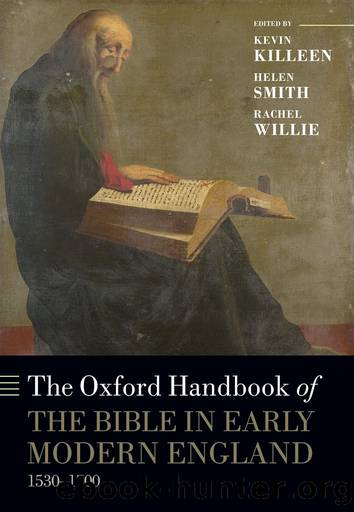The Oxford Handbook of the Bible in Early Modern England, c. 1530-1700 by Kevin Killeen

Author:Kevin Killeen
Language: eng
Format: epub
Publisher: OUP Oxford
Published: 2015-01-15T00:00:00+00:00
CHAPTER 23
MOVER AND AUTHOR: KING JAMES VI AND I AND THE POLITICAL USE OF THE BIBLE
JANE RICKARD
âTHERE are infinite arguments of this right Christian and Religious affection in your MAJESTIEâ, the translators of the Bible that was to become known as the King James Bible announce in their âEpistle Dedicatorieâ. â[B]ut none is more forcible to declare it to othersâ, they continue, âthen the vehement and perpetuated desire of the accomplishing and publishing of this Workeâ. The new Bible translation, as this assertion renders explicit, constituted a public statement about Jamesâs religious commitment. The translators identify another of the âinfinite argumentsâ for the Kingâs âright Christian and Religious affectionâ as his own anti-Catholic publications, implicitly aligning royal authorization and royal authorship, the divine word and the royal word. The dedication also presents James as âauthorâ in the sense of âcreatorâ, stating that his subjects bless him as âthat sanctified person, who under GOD, is the immediate authour of their true happinesseâ. The King is beneath God, but reflects the divine in his ability to originate, to create. These different but interconnected conceptions of royal authorship inform the translatorsâ more well-known assertion that the King is âthe principall moover and Authorâ of the translation.1
These prefatory comments reflect the fact that Jamesâs sponsorship of the translation early in his English reign was no one-off act of religious devotion but an extension of a highly politicized project of moving, authoring, and authorizing. These were endeavours which he had pursued since the 1580s when he was a young King of Scotland, and which he would continue to pursue throughout his reign. Jamesâs political use of the Bible took three main forms. His employment of scriptural interpretation in his own publications, including those anti-Catholic works highlighted by the Bible translators, was the first. The second was his interventions in the work of his preachers, which in various ways sought to shape what was preached and when. Sponsoring the Bible translation was the third and most ambitious dimension of Jamesâs attempts to mediate and direct the access of his subjects to the Word of God. This direct and visible royal participation in scriptural interpretation, preaching, and Bible translation reflects Jamesâs political shrewdness. These activities also, however, put the King in some awkward and exposed positions.
There has been some important work on sermons in recent years, and the King James Bible attracted more critical attention than ever around the quartercentenary of its publication.2 Yet there still has not been sufficient recognition of how sermons and translation were for the King only parts of a larger project in which his own publications were vital. The present chapter explores Jamesâs writings alongside some of his other interventions in the work of the church in Scotland and England, and highlights how central his role as an interpreter of scripture was to his conception and exercise of his authority. The chapter also considers how Jamesâs self-construction as scriptural interpreter was greeted by his English subjects. It argues that contemporaries such as
Download
This site does not store any files on its server. We only index and link to content provided by other sites. Please contact the content providers to delete copyright contents if any and email us, we'll remove relevant links or contents immediately.
| Books & Reading | Comparative Literature |
| Criticism & Theory | Genres & Styles |
| Movements & Periods | Reference |
| Regional & Cultural | Women Authors |
4 3 2 1: A Novel by Paul Auster(12360)
The handmaid's tale by Margaret Atwood(7744)
Giovanni's Room by James Baldwin(7313)
Asking the Right Questions: A Guide to Critical Thinking by M. Neil Browne & Stuart M. Keeley(5747)
Big Magic: Creative Living Beyond Fear by Elizabeth Gilbert(5738)
Ego Is the Enemy by Ryan Holiday(5406)
The Body: A Guide for Occupants by Bill Bryson(5067)
On Writing A Memoir of the Craft by Stephen King(4924)
Ken Follett - World without end by Ken Follett(4713)
Adulting by Kelly Williams Brown(4560)
Bluets by Maggie Nelson(4541)
Eat That Frog! by Brian Tracy(4508)
Guilty Pleasures by Laurell K Hamilton(4433)
The Poetry of Pablo Neruda by Pablo Neruda(4084)
Alive: The Story of the Andes Survivors by Piers Paul Read(4013)
White Noise - A Novel by Don DeLillo(3999)
Fingerprints of the Gods by Graham Hancock(3982)
The Book of Joy by Dalai Lama(3965)
The Bookshop by Penelope Fitzgerald(3838)
